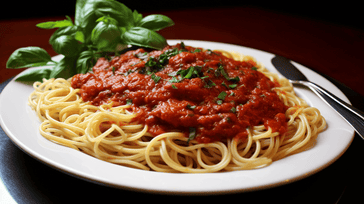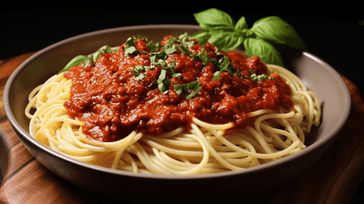Your Guide to Perfect Classic Marinara Sauce Every Time!
Advertisement

Are you tired of lackluster marinara sauce from store-bought jars? Look no further than classic marinara sauce – a timeless staple in Italian cuisine. This guide will provide you with all the necessary tips and tricks to achieve the perfect homemade marinara sauce every single time.
What is Classic Marinara Sauce?
Classic marinara sauce is a simple tomato-based sauce that originated in Italy and has become a beloved staple in cuisines around the world. It is typically made with a few essential ingredients like canned tomatoes, garlic, onions, herbs, and olive oil. The sauce is known for its bright, tangy flavor and versatility in both cooking and serving.
Unlike other tomato sauces, marinara sauce is not typically cooked for an extended period, as it aims to retain the bright, fresh flavor of the tomatoes. The sauce can be served chunky or smooth, and can be made with a variety of seasonings and spices.
Whether you are an experienced cook or a novice in the kitchen, mastering a classic marinara sauce is an essential skill to have in your repertoire. With a few simple ingredients and techniques, you can achieve a delicious and authentic homemade marinara sauce every time.
Homemade Marinara Sauce Recipes

There's nothing quite like the taste of homemade classic marinara sauce. With a few basic ingredients and simple steps, you can make a delicious marinara sauce in no time. Here are some of our favorite recipes.
Traditional Marinara Sauce
| Ingredients | Instructions |
|---|---|
|
|
This classic recipe yields a smooth and flavorful marinara sauce that can be used in a variety of dishes.
Chunky Marinara Sauce
| Ingredients | Instructions |
|---|---|
|
|
This recipe creates a thick and chunky marinara sauce that is perfect for pasta or pizza.
Essential Ingredients for Classic Marinara Sauce
When it comes to making perfect classic marinara sauce, using high-quality ingredients is essential. Here are the key players:
| Ingredient | Importance |
|---|---|
| Canned Tomatoes | Choose high-quality whole peeled tomatoes for the best flavor and texture. |
| Garlic | Fresh garlic adds bold flavor and aroma. |
| Onion | Onions bring sweetness and depth to the sauce. |
| Olive Oil | Extra virgin olive oil adds richness and fruity notes. |
| Herbs | Traditional herbs for marinara sauce include basil, oregano, and thyme for a classic Italian flavor. |
These ingredients work together to create a harmonious blend of flavors that make classic marinara sauce deliciously irresistible.
Pro tip: Use fresh ingredients whenever possible for the best results. Fresh herbs and garlic add vibrant flavor that canned versions can't match.
Variations to Consider
While the ingredients listed above are the baseline for a classic marinara sauce, there's plenty of room for experimentation and customization. Consider incorporating additional ingredients, such as:
- Red pepper flakes for a spicy kick
- White wine for a bright acidity
- Mushrooms for extra texture and umami flavor
Don't be afraid to play around with the ingredients to suit your taste preferences and create a unique, personalized marinara sauce that's perfect every time.
Tips for Perfecting Marinara Sauce

Marinara sauce is a simple, yet flavorful tomato-based sauce that can enhance a variety of dishes. With a few expert tips and tricks, you can perfect your homemade marinara sauce and take your culinary creations to the next level.
Simmering Time
The key to achieving a rich and hearty marinara sauce is to let it simmer low and slow. Depending on your recipe, simmering times can vary from 20 minutes to several hours. The longer the sauce cooks, the more concentrated the flavors become. Be sure to stir the sauce occasionally and keep an eye on the thickness, adding water or broth as needed.
Seasoning Adjustments
Marinara sauce typically includes basic seasoning like salt, pepper, and oregano. However, don't be afraid to experiment with different herbs and spices to create a unique flavor profile. Add a pinch of red pepper flakes for some heat or fresh basil leaves for a touch of sweetness. Taste frequently while adjusting the seasoning to your preference.
Techniques for Achieving Desired Thickness
If you prefer a chunky marinara sauce, use diced tomatoes or chop the canned tomatoes before adding them to the sauce. To achieve a smooth and velvety texture, use a hand blender or food processor to puree the sauce. For a thicker consistency, let the sauce reduce on a low heat for a longer period of time.
Enhancing the Flavors
To add depth and complexity to your marinara sauce, consider adding a splash of red wine, balsamic vinegar, or Worcestershire sauce. These ingredients can help balance the acidity of the tomatoes and create a richer flavor profile. Experiment with different ingredients in small amounts to discover what works best for your taste preferences.
By following these tips, you can perfect your classic marinara sauce recipe and create delicious homemade marinara sauce every time. Enjoy the process of experimenting with different combinations of herbs and spices and make it your own.
Serving Suggestions for Marinara Sauce
Classic marinara sauce is a versatile ingredient that can elevate a wide range of dishes. Here are some traditional and creative ways to incorporate homemade marinara sauce into your meals:
Pasta Dishes
Marinara sauce is a staple in Italian cuisine and pairs perfectly with pasta. It's an excellent topping for spaghetti, linguine, penne, and other pasta shapes. Add some freshly grated parmesan cheese on top for a delicious finish.
Pizzas
Marinara sauce is the perfect base for homemade pizzas. Spread a generous amount on the pizza crust and add your favorite toppings like mozzarella cheese, pepperoni, mushrooms, and bell peppers.
Meatballs
Marinara sauce is the perfect topping for homemade meatballs. Prepare the meatballs and cook them in the sauce until they're tender and juicy. Serve them with crusty bread on the side.
Dipping Sauce
Marinara sauce also makes a delicious dipping sauce for garlic bread, cheese sticks, and even fried foods like onion rings and chicken tenders.
Soups and Stews
You can add marinara sauce as a flavor base for soups and stews. It adds depth and richness to tomato soup, vegetable soup, and lentil soup.
Vegetables
Marinara sauce can make plain vegetables more exciting. Roast some veggies like broccoli or cauliflower and toss them with marinara sauce to add a pop of flavor.
Experiment with different ways to use marinara sauce and discover your favorite combinations. The possibilities are endless!
Serving Suggestions for Marinara Sauce

Now that you've mastered the art of classic marinara sauce, it's time to enjoy it in all its delicious glory! Here are some ideas for serving this versatile sauce:
- Classic spaghetti: Toss your freshly made marinara sauce with al dente spaghetti for a simple and satisfying meal.
- Pizza sauce: Spread the sauce on homemade or store-bought pizza crust, and add your favorite toppings.
- Dipping sauce: Use marinara sauce as a dipping sauce for garlic bread or mozzarella sticks.
- Meatball sauce: Pour the sauce over homemade meatballs for a classic Italian dish.
- Lasagna: Layer the sauce with lasagna noodles and ricotta cheese for a comforting casserole.
Don't be afraid to get creative with your marinara sauce! Use it as a base for soups, stews, and casseroles, or simply enjoy it as a dip for vegetables or crackers.
Common Mistakes to Avoid
While classic marinara sauce is a simple and straightforward recipe, there are a few common mistakes that can ruin its flavor and texture. To ensure that your homemade marinara sauce turns out perfectly every time, watch out for the following pitfalls:
- Don't Burn the Garlic: Garlic adds a distinctive flavor and aroma to the sauce, but overcooking it can make it taste bitter. Be sure to sauté the garlic until it turns fragrant and just begins to turn golden, taking care not to burn it.
- Don't Let the Sauce Boil: While it's tempting to let the sauce boil to speed up the cooking process, this can cause it to break down and become watery. Keep it at a gentle simmer, stirring occasionally, until it thickens to your desired consistency.
- Avoid Using low-quality canned tomatoes: High-quality canned tomatoes are the key to a delicious marinara sauce. Choose canned tomatoes that are plump, firm, and have a bright red color. Avoid those that are pale or discolored, and always check the expiration date.
- Don't Add Too Much Salt: While salt is essential to bring out the flavors of tomatoes and other ingredients, it's easy to overdo it. Start with a small amount of salt and taste as you go along, adjusting as needed.
- Don't Skimp on Fresh Herbs: Fresh herbs like basil, oregano, and parsley add a burst of flavor to marinara sauce. Don't be tempted to use dried herbs as a shortcut, as they can't compare to the fresh taste of their counterparts.
By avoiding these common mistakes, you can create a delicious and authentic marinara sauce that will impress your guests and satisfy your cravings.
Frequently Asked Questions (FAQ) about Marinara Sauce
If you have any questions about classic marinara sauce, you're not alone! Here are some frequently asked questions and their answers:
What makes marinara sauce different from other tomato-based sauces?
Marinara sauce is a simple tomato-based sauce that consists of only a few ingredients, including tomatoes, garlic, onions, olive oil, and herbs. It's thinner than some other tomato-based sauces and it's typically served with pasta.
What are some variations of marinara sauce?
There are many variations of marinara sauce, but some common ones include adding meat, such as ground beef or sausage, or adding vegetables, such as bell peppers or mushrooms. Some people also like to add wine to their marinara sauce for added flavor.
Can I make marinara sauce without garlic?
While garlic is a key ingredient in marinara sauce, you can omit it if you prefer. However, keep in mind that garlic adds a lot of flavor to the sauce, so you may need to adjust the seasoning accordingly.
Can I make marinara sauce ahead of time?
Yes, you can make marinara sauce ahead of time and store it in the refrigerator for up to four days. You can also freeze it for up to six months. Just be sure to cool the sauce before storing it and thaw it in the refrigerator before using it.
Can I use canned tomatoes instead of fresh tomatoes?
Yes, you can use canned tomatoes instead of fresh tomatoes. In fact, many people prefer to use canned tomatoes because they're consistent and convenient. Just be sure to use high-quality canned tomatoes for the best flavor.
Is marinara sauce gluten-free?
Marinara sauce is typically gluten-free, but it's always a good idea to check the ingredients to make sure. Some canned tomatoes may contain gluten, and some recipes may call for ingredients that contain gluten, such as flour for thickening.
Can I make marinara sauce in a slow cooker?
Yes, you can make marinara sauce in a slow cooker. Simply combine all of the ingredients in the slow cooker and cook on low for 6-8 hours or on high for 3-4 hours.
We hope these answers help you make the perfect marinara sauce every time!